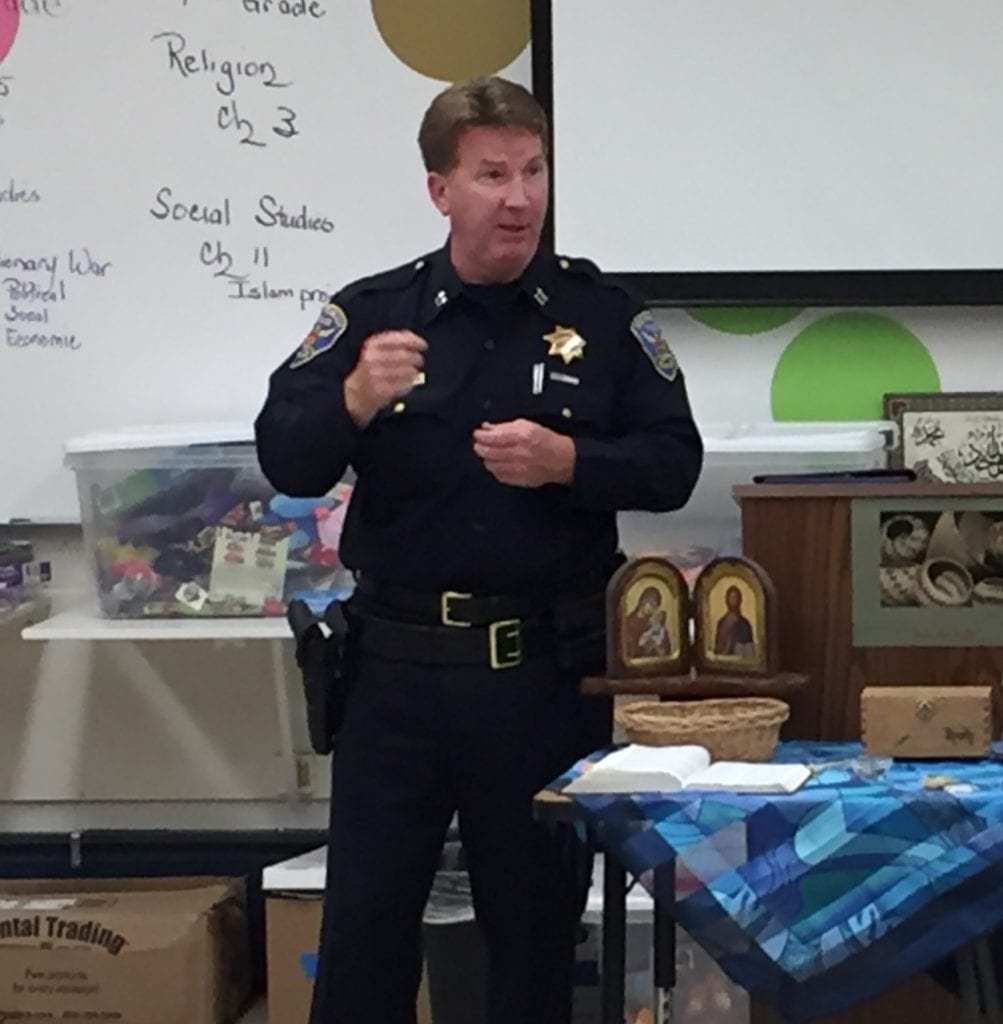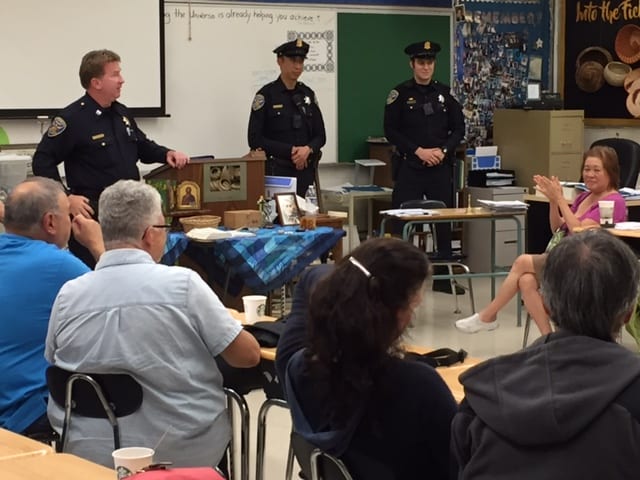To celebrate the Glen Park Association Website turning ten years old, we are reposting some of our favorite stories from the last ten years.

Story and photos by Bonnee Waldstein
The monthly Ingleside Station Community Meeting found its way into St. John the Evangelist Elementary School in October. The two-dozen or so attendees seemed to come from the wider area covered by the Ingleside Station; there were few, if any, familiar faces from Glen Park.
Personal Safety:
Captain McFadden gave a quick tutorial on keeping yourself safe in your neighborhood. Early darkness in fall and winter means people must be on heightened alert. In Glen Park, the BART station area is a particular crime target. “People can be oblivious,” said the captain. “Walking around staring at your phone is like waving a $500 bill on the street.” Grabbing computers, mostly from women, is getting more common.
One thing to watch out for is, if no one else is on the street, and a car passes you twice. That could mean one person is dropped off to rob you and the car will pick them up afterward.
“If you’re being followed, bring attention to yourself. Try to find a well- lighted area. Stop a car on the street. Go to a merchant. Go to the nearest residence door and ring the bell. Not many criminals will follow you up a flight of stairs. Take a picture if you can at the top of the stairs. Their psychology is to want the element of surprise. Once they see you’re onto them, they’re likely to seek out an easier target.”
Police Body Cameras:
The SFPD has recently obtained and begun wearing body cameras, initially in the Bayview and the Mission. They’ll be in use throughout the department by the first of the year.

Two officers, Benjamin Shih and David Dito, demonstrated how they’re worn and used. The camera is mounted on the chest of the uniform. Except for personal time, it’s always recording video, indicated by a green light, and saves thirty seconds prior to the active incident. The officer is required to tap it on (indicated by red light) at the beginning of the incident, which switches on the audio as well.
The recording is time and date stamped, and downloaded at the end of each shift. It’s a permanent record that can’t be erased or manipulated. Captain McFadden noted that Seattle has discontinued the body cameras due to the huge data storage issues.

In the Captain’s view, the cameras are a great idea in many ways. It allows the police to look back on an incident and get a more accurate picture of what happened. It can abate situations that might otherwise escalate, when a potential criminal knows they are being video recorded. The video provides great evidence for prosecution. It also will cut down on the large number of false and sometimes frivolous complaints that eat up valuable police time.
The video is not turned on when officers are investigating sexual assault cases. Only the police, the district attorney and the Office of Citizen Complaints can use it.
Crime Stats:
It’s the seventh month in a row that the Ingleside Station is down overall in crime, although there’s been an uptick in shootings and gang activity.
Crime rates tend to have peaks and valleys because of retaliation. It will go on for a while until we start making arrests, said the Captain.
Citizen Help Needed:
Captain McFadden introduced Arturo Castillo, a local activist, who’s been helpful in letting the police know what’s going on with gang activity. The police can’t be everywhere and rely on citizens to help them out with tips and information.
Witnesses are vital to prosecuting crime. Even if there’s cell phone video of an incident, the victim must still be willing to identify the perpetrator. Without a witness statement the same people can be arrested day in and day out, and be back on the street within 24 hours.
It’s frustrating for the police to pursue to the point of arrest and then find that the victim “doesn’t want to put someone in jail.” The Captain observed that not everyone goes to jail: there’s probation, ankle bracelets, and education.
The district attorney has started a camera registration program and the Ingleside Station is starting its own. It would be very helpful to know where security cameras are in our sector. The cameras might not capture the actual incident but they might get a street sign, a license plate, or where the perpetrators came from, or where they went. The captain would appreciate people emailing him about any pertinent footage people have.
In identifying or remembering a perpetrator, the captain gave this tip: You won’t remember head to toe, but shoes don’t change. They’re often unique to a lot of perpetrators. Also, noticing scars and tattoos helps a lot of convictions.
If You Are Stopped by Police:
In light of recent high profile incidents, the captain offers this advice: If you are stopped in your car, pull over and put your hands up where they can be seen. Let the officer know before you do anything, for example, “I have my registration, can I get it?” There are many young officers in the SFPD. Officers are tense on every traffic stop. Don’t argue and try to push the envelope. Remember that you are required to follow a lawful order.
Vehicular Crime:
In Glen Park, all types of crime involving vehicles seem to be an epidemic: Vehicle theft, smash and grab, and vandalism. “My car was stolen two weeks ago, it was a beat up minivan – what are the odds of recovery?” asked one of the attendees. The captain said “ratty” cars are usually stolen for joy rides and recovered within 24-48 hours.
The captain was asked about the recent San Francisco Civil Grand Jury report on auto burglary. Among the recommendations was that, due to the mobility of career criminals, a permanent serial crimes unit at headquarters is needed. It would enable cross-district investigations.
Captain McFadden replied that he’d rather work such a unit out of his own jurisdiction. San Francisco is a small city; all the stations get crime alerts everyday and communicate everyday with each other – the Bayview is the sister station of the Ingleside. The captain warned that enacting this recommendation would lead to large numbers of police being diverted to the tourist areas and the neighborhoods would suffer.
Someone asked about securing weapons in police cars. That happens outside the SFPD. There are many agencies with police powers. The policy of the SFPD is not to keep weapons unsecured in their vehicles.
Search for New Police Chief:
Captain McFadden is strongly supporting acting chief Toney Chaplin. “He’s the right man for the right job.” Hiring outsiders is not a good idea: “It’s a different planet here, the craziness of San Francisco. They don’t understand the communities, the neighborhoods, and the cultural diversity. We need someone who knows it from within.” The captain doesn’t expect that the mayor will make a choice until after the election.
As far as the recent Department of Justice COPS (Community Oriented Police Services) Report, Captain McFadden said it was thorough but not as scathing as the media has reported. The SFPD has been working through the recommendations for a long time, and 90% have already been addressed. “There are problems, but we’re doing OK and headed in the right direction.”
The Captain’s email: joseph.mcfadden@sfgov.org